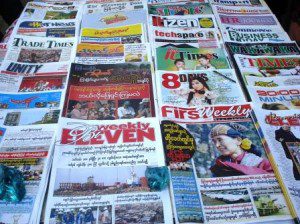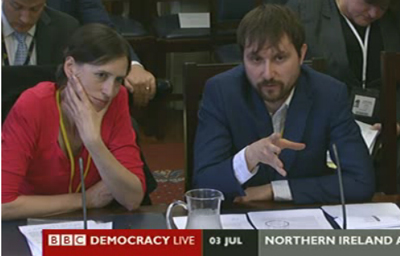15 Jul 2013 | Burma
Burma has made significant advances during the transition period, with progress across all the categories of this report: politics & society, media freedom, artistic freedom and digital freedom. The situation in the country has significantly improved since the beginning of the transition.
Underpinning the increased freedom of expression are the significant political changes that have seen the release from house arrest of Aung San Suu Kyi and the election of NLD parliamentarians during the 2012 by-elections. The release of Aung San Suu Kyi, the regime’s most high-profile critic and political opponent, and other political prisoners was seen as a public signal to the Burmese people and civil society that the transition to civilian government was a possibility and that the government would tolerate dissent to greater latitude than in the past. Beyond this, a number of concrete advances have been made for freedom of expression including the abolition of the censorship boards, the end to the filtering of social networks and VOIP telecommunications, the return of daily newspapers and the greater latitude given to political expression, press comment and artistic expression by government officials.
(more…)
9 Jul 2013 | Asia and Pacific

The number and range of media in Burma has proliferated
Going against its own Press Council, parliamentarians in Burma have passed a restrictive new press law that will restrict freedom of the press, Mike Harris reports.
On 4 July, Burma’s lower house of parliament (Pyithu Hluttaw) passed a restrictive press law that will restrict freedom of the press and kept in place many of the most draconian elements of the existing legal framework.
The Printing and Publishing Enterprise Law, drafted by the Ministry of Information, renews the government’s power to license newspapers, news websites and foreign news agencies and has strict rules on obscenity and the incitement of public disorder. The Ministry of Information’s draft law has been viewed by members of Burma’s fledgling press council as an attempt to undercut their attempts to formulate a new press law. Burma’s Press Council was founded by the government in October 2012 with the intention that journalists, their trade unions, media owners and civil society stakeholders should develop a new press law. After a disappointing first attempt at reform, the Press Council is currently working on a second draft of its law.
In the meantime, the Ministry of Information drafted its own press law, aimed at undercutting the more open and inclusive process undertaken by the Press Council. While abolishing some of the prison sentences under the old Printing and Publishing Enterprise Law (1962), the law keeps criminal sanctions as well as excessively high fines for media organisations breaching the law.
After the publication of this law, Burma’s increasingly vocal civil society launched a public campaign to prevent the adoption. The Press Council sent letters to the president and the Speaker of Parliament setting out their objections to the proposals. It seemed that parliament was more responsive to the demands of civil society when after coordinated pressure, the Chair of Parliament’s House of Representatives Sports, Culture and Public Relations Development Committee (and Vice-Chair of the Union Solidarity and Development Party), Thura Aye Myint, said the law needed reflecting upon and it would not be debated in this session of parliament. Yet, just three months later, the law was passed by the lower house.
In response, members of the Press Council have now threatened to resign on mass. Eleven Myanmar reports that Zaw Thet Htwe, a member of the Myanmar Journalists Union (MJU), has expressed his disappointment with the bill stating:
“We opposed the press bill when it came out. Then, the minister met with the Press Council. Provisions on printing and publishing are also enshrined in the media bill drafted by the council. So we demanded those provisions be removed from the press bill. The ministry refused it and promised to amend some provisions. But it is not the same as they said when the bill was approved. We have to reconsider dealing with the ministry [altogether]”.
Burma’s upper house will now need to consider whether to pass the Ministry of Information’s restrictive law, or consider the Press Council’s proposals when they are finalised. If the Ministry of Information’s press law is passed, it will call into question how serious the government of Burma is in reforming its draconian legal landscape for freedom of expression.
3 Jul 2013 | United Kingdom

Mike Harris, Head of Advocacy at Index on Censorship, and Jo Glanville give evidence before the finance committee of the Northern Ireland Assembly on Wednesday.
MLAs will today be told that reform of Northern Ireland’s outdated law is needed or else the province will lose out on investment, writes Mike Harris in the Belfast Telegraph
In 2008, the United Nations Human Rights Committee condemned the libel law of England, Wales and Northern Ireland for having a chilling effect on free speech across the world.
Not only did important elements of the law pre-date the invention of the light bulb, let alone the internet, but corporations and oligarchs could bully their critics with near-impunity, silencing freedom of expression both here but also abroad.
The courts heard cases with no connection at all to this jurisdiction. One Ukrainian oligarch sued a local Ukrainian paper and a disgraced Saudi businessman, Sheikh Khalid bin Mahfouz, sued a US academic for a book not even published here.
To protect free speech, US President Barack Obama signed into law the US Speech Act to protect US citizens from the effect of English, Welsh and Northern Irish libel law, an act described as a “national embarrassment” by MPs.
Now Northern Ireland is alone with its embarrassing libel law. The law of England and Wales has been substantially reformed after the Libel Reform Campaign won support from 60,000 members of the public and over 100 charities and campaigning groups and in response the Government passed the Defamation Act.
Meanwhile in the Republic of Ireland, the Defamation Act of 2009 made modest changes to update the law to reflect the internet age and improve the defences available to those sued.
It is extremely unfortunate that Sammy Wilson, the Minister of Finance and Personnel, personally vetoed adoption of the Defamation Bill without scrutiny by either the Assembly or the Executive.
The worry is that “libel tourists” such as corrupt businessmen, powerful vested interests and global corporations may begin to use the High Court in Belfast to silence their critics using Northern Ireland’s unreformed law.
When we started our campaign, we asked people to tell us what had been censored using the libel laws. The results were startling.
Half of GPs surveyed said libel laws were stifling debate about the safety of drug treatments. Which? told us it went through lengthy legal proceedings by a manufacturer after they lab tested child safety seats.
Mumsnet faced legal action for humorous posts on its forum. Those who spoke out on the dumping of toxic waste in Africa and the funding of terrorism were taken to court.
Chillingly, cardiologist Dr Pete Wilmshurst told us how he was being sued by a US corporation for pointing out possible problems with heart devices.
In the four years he fought his case, patients continued to have these devices implanted in their hearts. Some then needed extensive surgery to have them removed because of the fault. If his concerns hadn’t been silenced by his four-year libel case, doctors may not have recommended this treatment.
Dr Wilmshurst will be joining me, English PEN and Sense About Science to give testimony to the Finance and Personnel Committee of the Northern Ireland Assembly today after the Chair Daithi McKay personally intervened to ensure Northern Ireland has a debate about these laws.
Mike Nesbitt MLA is also working with lawyers to prepare a Defamation Bill to bring to the Assembly later this year.
While Sammy Wilson thinks there is no need for reform, other politicians beg to differ.
If Northern Ireland gets this right, it will have a law fit for the internet age that protects ordinary people and GPs, scientists and academics speaking out in the public interest.
If it fails to reform the law, it’s hard to see how it will attract internet companies with a publication rule from 1849; how it will attract academics with no public interest defence for their work, or ensure books don’t get pulped (as they have done) with little protection for comment or opinion.
England and Wales have enacted wholesale libel reform for the first time in 170 years, Northern Ireland cannot afford to miss this opportunity.
This article originally appeared at the Belfast Telegraph.


